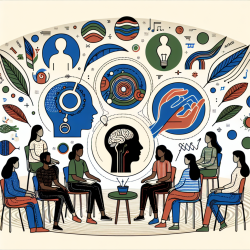Introduction
The mental health challenges faced by young migrants are complex and multifaceted, often exacerbated by the stress of acclimation and acculturation in a new environment. The research article "Young Migrant Mental Health Difficulties and Suicidal Behaviors: An Alternative Perspective" highlights critical findings from the SEYLE study, which can significantly enhance the skills of practitioners working with this vulnerable population. This blog aims to explore the study's outcomes and provide actionable insights for practitioners to improve service delivery and advocate for further research.
Understanding the SEYLE Study Findings
The SEYLE study, conducted across ten European Union countries, sheds light on the mental health difficulties and suicidal behaviors among adolescent migrants. It reveals that first-generation migrants exhibit higher rates of suicide attempts and peer difficulties compared to non-migrants. Notably, the prevalence of serious suicidal ideation is significantly higher among first-generation and non-European second-generation migrants.
The study underscores the need for school-based support and appropriate mental health services to address these challenges. However, it also points out the limitations of current data analysis, emphasizing the need for a more comprehensive approach that considers additional factors such as depression, hyperactivity, bullying, and peer relations.
Implementing Effective Interventions
For practitioners, the SEYLE study offers valuable insights into identifying and addressing the mental health needs of young migrants. Here are some strategies to enhance practitioner skills:
- Early Identification and Screening: Utilize reliable screening tools like the Columbia-Suicide Severity Rating Scale (C-SSRS) to identify at-risk individuals. Focus on those exhibiting signs of depression, hyperactivity, or peer difficulties.
- Addressing Peer Relations: Foster a supportive school environment that encourages positive peer interactions. Implement anti-bullying programs and provide resources for students to develop healthy social skills.
- Cultural Sensitivity and Training: Enhance cultural competence among practitioners by providing training on the unique challenges faced by migrant youth. Tailor interventions to be culturally relevant and effective.
- Collaborative Efforts: Work closely with schools, families, and community organizations to create a comprehensive support network for young migrants. Encourage open communication and collaboration among stakeholders.
Encouraging Further Research
While the SEYLE study provides a solid foundation, further research is essential to fully understand the complexities of young migrant mental health. Practitioners are encouraged to advocate for and participate in research initiatives that explore additional risk factors and intervention strategies. By contributing to the body of knowledge, practitioners can help shape policies and programs that better serve this population.
Conclusion
The SEYLE study offers valuable insights into the mental health challenges faced by young migrants and highlights the need for targeted interventions. By implementing the study's findings and advocating for further research, practitioners can enhance their skills and provide more effective support to this vulnerable population.
To read the original research paper, please follow this link: Young migrant mental health difficulties and suicidal behaviours: an alternative perspective.










